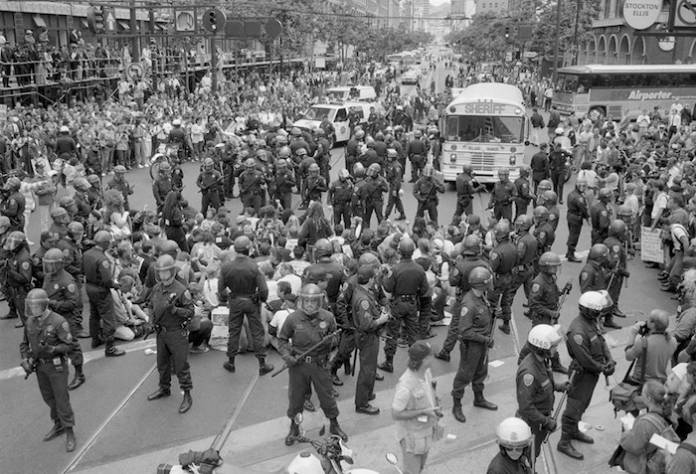25th anniversary events commemorate historic Sixth International Conference on AIDS protests — and reunite seminal local activists, Fri/19-Sun/21.
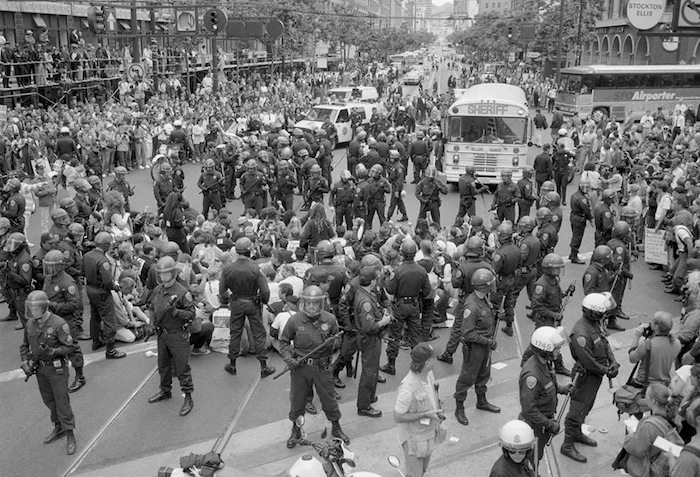
By Marke B.
JUNE 16, 2015 — “We were fraught, frustrated, enraged, and with very little hope. But we were also determined, and with all of us together there was a feeling of strength and even festivity.”
Journalist Tim Kingston is telling me over the phone what it felt like to be in San Francisco from June 20-24 in 1990, when the AIDS Coalition to Unleash Power (ACT UP) staged historic protests during the Sixth International Conference on AIDS. Kingston, a self-described “fellow traveller,” was both a journalist and and activist at the time, a unique position which allowed him to cover the conference from inside the Moscone Center for the Bay Times, while still participating in protests throughout the city.
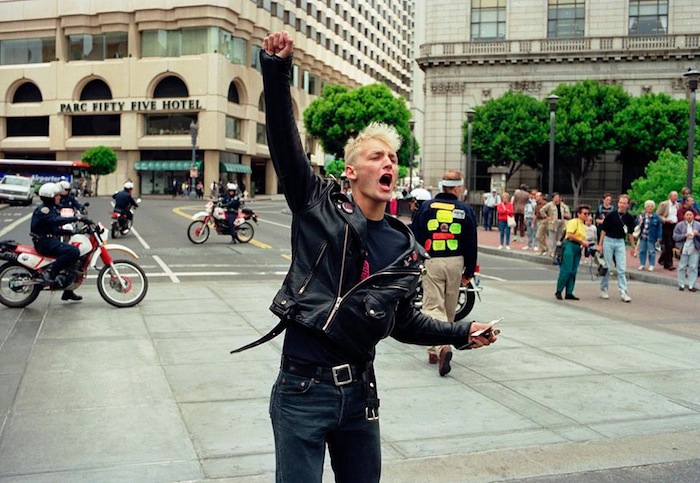
Now, Kingston and several others are hosting a series of commemorative events Fri/19-Sun/21 that address the historical legacy of the protests, reunite key members of the Bay Area ACT UP movement, and hopefully help educate a new generation about a key period in queer history. There will be panels, a march to honor the dead, and, of course, a party.
Why were AIDS activists protesting an international medical conference on AIDS, one designed ostensibly to help them? Several reasons: to bring attention to things the conference wasn’t sufficiently addressing, like the infection rate and treatment of women, people of color, and intravenous drug users, and to protest draconian laws against needle exchanges and a new law forbidding HIV-positive people from entering the country. (George Bush notoriously declined an invitation to the conference in order to attend a fundraiser for Jesse Helms, who had sponsored the HIV travel ban bill).
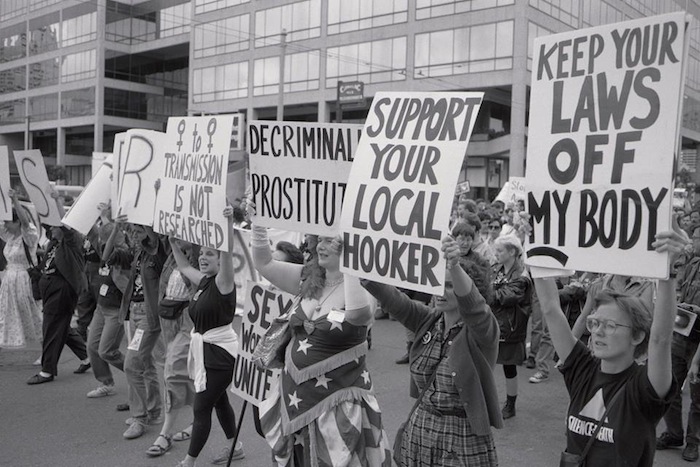
But most of all, the demonstrations were meant give those actually affected by the disease a voice, and to combat “this attitude from the government that was like, ‘yeah, yeah we’ll solve AIDS eventually, but let’s let those faggot queers die off first,” as Kingston put it.
“For me, the single most moving episode of the week took place at the conference, when a huge number of the delegates stood up and turned their back on [US Department of Health and Human Services Secretary] Louis Sullivan as he was speaking,” Kingston told me. “Then, all at once, they marched out of the Moscone Center and joined the Pride parade. That was such a powerful statement.”
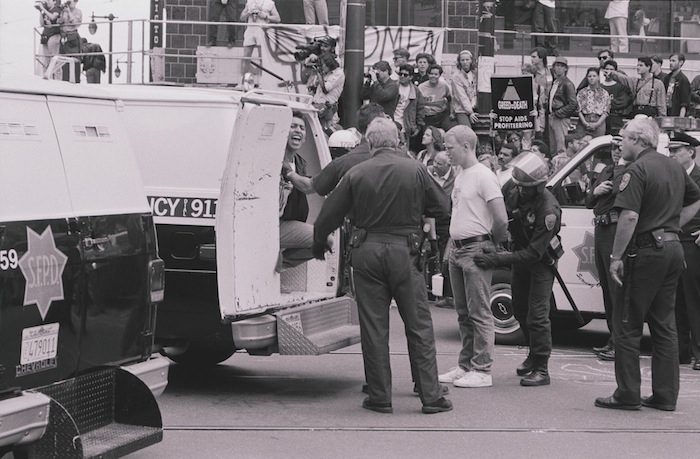
“There were protests everywhere: demos, sit-ins, die-ins, art actions. We wanted to give the medical establishment a big kick in the ass, to get it past this attitude of political complacency,” Kingston said. “In ’87, no one had heard of ACT UP. In ’89, we were banging on the door. And in ’90, we had arrived full-scale.”
(A great 2012 documentary, United in Anger, details some of the protests from a political perspective. Another, the Academy Award-nominated “How to Survive a Plague,” looks closely at the medical and structural issues. A third, the wonderful “We Were Here,” looks at the period from a personal, local perspective. Maybe don’t watch them all in a row, though.)
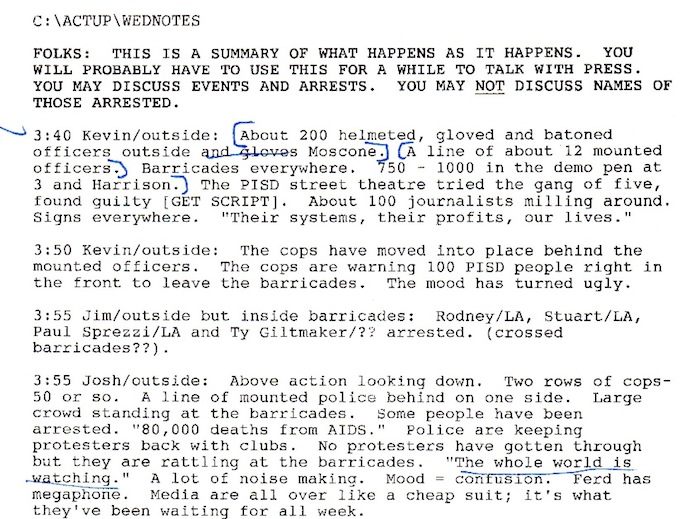
Kingston took part in the women’s demo. “It was loud, raucous, and had this momentous energy. There were also a lot of male supporters there, which most of the women really appreciated — but women remained center-stage.” He also attended the immigration demo. “The poor INS didn’t know what hit it. The bureaucrats at the GSA, which later became the much-more-ominous-sounding Homeland Security Department, had no idea what to do when this flamboyant, angry mass showed up on their doorstep.”
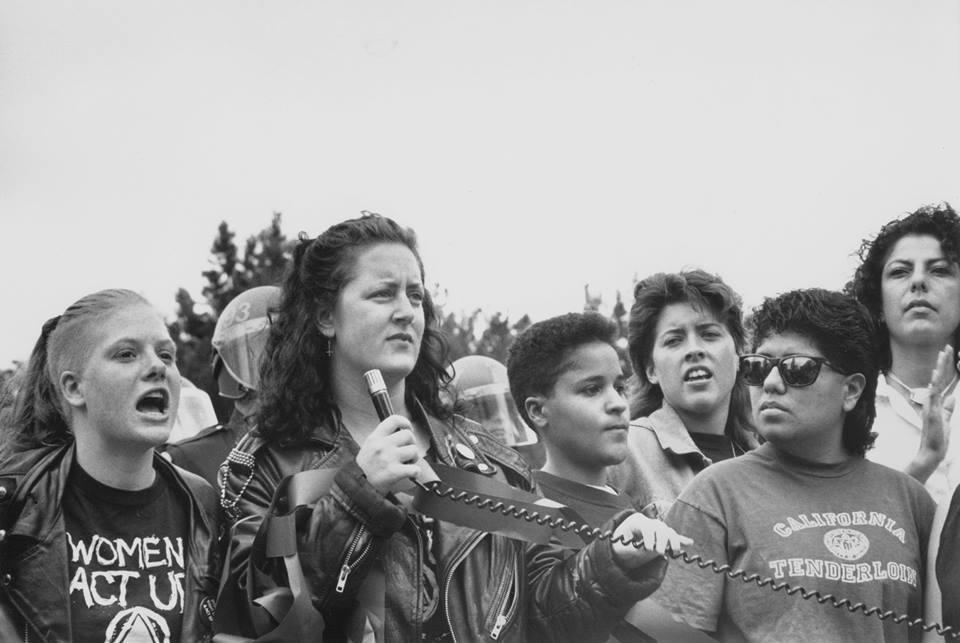
“Given the drug situation, we were in dire straits. There were only three parallel track drug treatments at the time: AZT, ddI, and D4T — and then weird things like compound Q,” synthesized from an Asian cucumber. “Combination drug therapy was unheard of, and talk of a vaccine didn’t seem to be leading anywhere.”
“But the protests weren’t all doom and gloom,” Kingston says. “There was a great deal of gleeful black humor, and silliness, and sex. Not only did we chant, ‘Act Up Fight Back Fight AIDS’ became ‘ACT UP Kick Back Get Laid’ and ‘ACT UP Fat Back Fried Egg.’ When we got bored with ‘How Many More Must Die!’ we said ‘Harmony Moore Must Die! wait WHO IS HARMONY MOORE?’ We were goofy.”
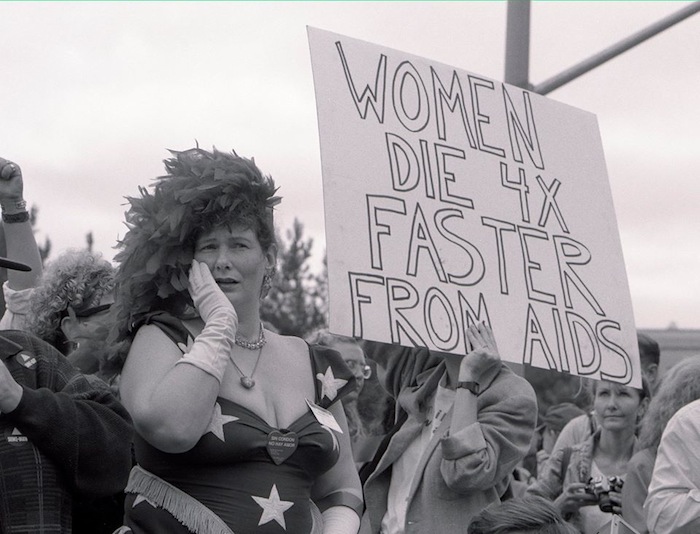
Twenty-five years later, though, what does Kingston hope the reunion will accomplish? “Well, first of all, we want to acknowledge that we’re still here, and that the activist movement is still unfolding through a lot of things some of us have gone on to do. People like Rebecca Hensler, Laura Thomas, Ingrid Nelson, Mike Shriver, Gerard Koskovich, and Michael Lauro have all continued on the path of helping the community in some way. So it’s an opportunity to take stock of how much the movement affected us.
“It’s also an opportunity to remember those who have passed, and to reckon with our own personal struggles with some of the trauma from that period. It’s still really hard for many of us. We want to acknowledge that.
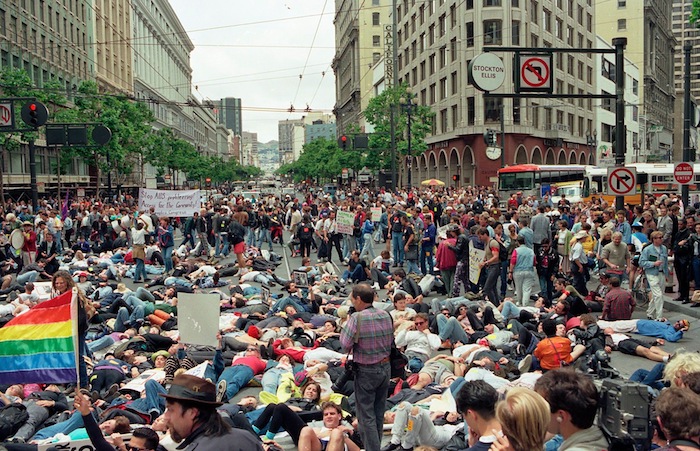
“But most of all, we want to celebrate our accomplishment, which was major. If ACT UP hadn’t pushed so hard, AIDS medical research would be 20 years behind. It would have been apocalyptic for queer culture.
“Of course, AIDS is now primarily a disease of the poor and people of color. So there’s still a lot of work to do.”
>>> ACT UP REUNION IN SF: 25TH ANNIVERSARY OF THE SIXTH INTERNATIONAL AIDS CONFERENCE
takes place Fri/19-Sun/21 at various venues.
Full schedule below. Facebook page is here.
(Also, check out the current show of ACT UP posters and related imagery at Magnet in the Castro.)
Friday, June 19:
WHAT’S YOUR DAMAGE?
8:30 PM, Magnet, 4122 18th St, San Francisco
An evening of art, performance and dialogue on the subject of how queers and activists who struggled through the crisis of the 80s and 90s are surviving / dealing / getting by in a present that is haunted and informed by that past.
WHAT’S YOUR DAMAGE? invites artists we admire to investigate feelings difficult to articulate or not often represented. Feelings like the romanticizing of the past, nostalgia for the sense of purpose we experienced during the crisis, exhaustion, regret, pride or the ambivalence of survivor’s guilt. We want to consider how the dangers of the present might be more insidious than the ones of the past because although they are perhaps less urgent, we face them as older people and without the mobilized activist groups of the 80s and 90s. We are thinking of dangers like gentrification, not having health insurance, not having enough money, drinking too much, getting older, sadness and the way virtual reality can make us lonely. We’re thinking of queers we have loved like Jason Bishop and José Esteban Muñoz and Spencer Cox. But we are mostly thinking of all of us, the ones who will be in San Francisco in June 2015 and who are getting by, somehow, more or less, or maybe even thriving. Curated by Jorge Ignacio Cortiñas and D-L Alvarez. No cover: come early to get a seat.
***
Saturday, June 20:
ACT UP SF Living History Panel:
6th International AIDS Conference Week of Action
4:30-7 pm PM, LGBT Center, 1800 Market
HIV/AIDS activists from around the country and world will be in San Francisco to honor the 25th Anniversary of the 6th International AIDS conference on June 20, 2015 with a panel at the LGBT Center from 4:30 to 7:00 pm entitled How ACT UP crashed the AIDS Conference Party and Changed the Agenda. The panelists-members of the original ACT UP/San Francisco-will discuss the planning behind the actions during the 6th International AIDS Conference in San Francisco, and the impact that they had on that conference and future conferences. Topics include the role of people living with HIV in determining the treatment and research agendas, immigration restrictions on people living with HIV, women and gender issues within the epidemic, threats to the San Francisco model of care, and the relationship between direct action activists and AIDS service organizations. The panel will be moderated by Deb Gould, PhD, author of Moving Politics: Emotion and ACT UP’s Fight Against AIDS.
***
Saturday Evening:
PARTY
8-12 pm, Cafe Flore, 2298 Market Street
It’s really not ACT UP if there isn’t a party. We capped off a week of activism at the 6th International with a street party that turned into Pink Saturday.
Cafe Flore was our home away from home, where most of the ACT UP trouble started (and most of the cruising). Come by after the panel on Saturday and join us for a bit of dancing and nostalgia.
We’re asking for a $10 contribution to help cover the costs of the weekend activities, but no one turned away for lack of funds.
Music, dancing, and nostalgia!
***
Sunday, June 21:
When Our Comrades Fell: An ACT UP Memorial
12:30 — 3:30 PM, The Women’s Building, 3543 18th St, San Francisco
Please join us to remember, honor, and lovingly dish our ACT UP comrades who did not live to celebrate this reunion with us. The ceremony will include music, poetry and a slideshow, and will highlight personal tributes to activists by activists.
The ceremony will take place i the Audre Lorde Room of the Women’s Building, where ACT UP was meeting when the Week of Action was being planned. Doors will open at 12:30 pm and the ceremony will start at 1 pm and end by 3 pm.
Contact Rebecca Hensler directly if you would like to honor a particular activist by speaking or reading a tribute during the ceremony. We are also seeking digital photos for the slideshow and print photos, signs and other ephemera for a display. Contact Ingrid Nelson if you would like to contribute to decorating the room.
Following the ceremony, we will carry photographs, banners and other ephemera from the Women’s Building to Castro and 18th where we will display them on the usual corner. You are then welcome to gather nearby to close the reunion weekend.

